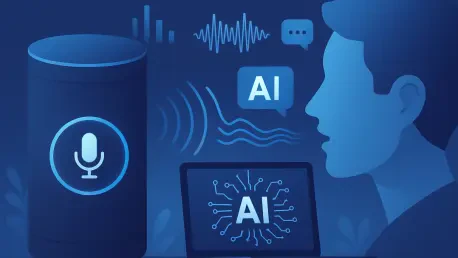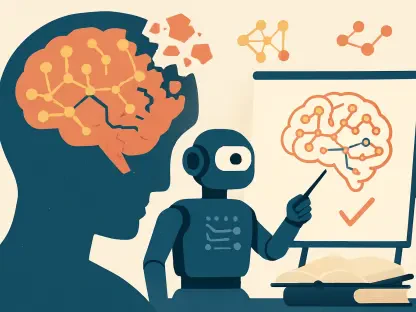Imagine a world where a simple spoken command can schedule a doctor’s appointment, draft a business proposal, or even guide a visually impaired person through a crowded street with real-time directions, transforming daily life in profound ways. Voice artificial intelligence (AI) is no longer a futuristic fantasy but a transformative force reshaping how humans interact with technology daily. This remarkable technology, driven by advancements in natural language processing and machine learning, is streamlining operations across industries, enhancing accessibility, and redefining consumer experiences. From virtual assistants handling customer inquiries to innovative applications in telemedicine and education, voice AI is breaking down barriers and making technology more intuitive. However, as its adoption surges, so do pressing questions about privacy, bias, and societal implications. This exploration delves into the profound impact of voice AI, examining its technological strides, ethical challenges, and the potential it holds for shaping future interactions in a rapidly evolving digital landscape.
Technological Breakthroughs Driving Adoption
Voice AI has witnessed staggering advancements, propelling its integration into diverse sectors with unprecedented speed. Cutting-edge models, such as Microsoft’s updated Dragon voice system and the open-source VibeVoice TTS framework, have redefined the quality of synthetic speech, making interactions feel strikingly human-like. Businesses are capitalizing on these tools to enhance customer service, automate appointment scheduling, and process transactions efficiently, resulting in significant cost reductions and improved user satisfaction. The intuitive nature of voice interfaces, often seen as more accessible than traditional text-based systems, is enabling broader adoption, particularly among those less comfortable with conventional technology. Moreover, the seamless integration into mobile devices is lowering interaction barriers, opening new use cases in education, entertainment, and healthcare. As industry leaders continue to innovate, the momentum behind voice AI shows no signs of slowing, promising even more sophisticated applications on the horizon.
The ripple effects of these technological strides are evident in both business-to-business and business-to-consumer markets, where competition is fierce. Recent developments, including OpenAI’s GPT-realtime API, have set new benchmarks for conversational AI, pushing startups and established firms alike to elevate their offerings. This competitive landscape is fostering rapid innovation, with voice agents becoming integral to enterprise automation and personal assistance solutions. Beyond mere convenience, the technology is enabling immersive experiences when paired with emerging tools like augmented reality, creating possibilities for interactive learning and entertainment. However, achieving optimal performance remains a hurdle, as low-latency responses and accurate speech recognition across diverse accents are critical for widespread trust and adoption. The ongoing refinement of these systems underscores a commitment to making voice AI not just a novelty, but a cornerstone of modern digital ecosystems.
Ethical Dilemmas and Societal Concerns
As voice AI becomes deeply embedded in daily life, ethical challenges surface with equal intensity, demanding careful consideration. Privacy stands out as a paramount concern, with users often unaware of how their voice data is stored, processed, or potentially misused. Innovations like Microsoft’s Dragon model, while groundbreaking, raise alarms about the creation of deepfakes and other deceptive content that could erode trust in digital interactions. Additionally, the risk of amplifying misinformation through voice-based platforms poses a significant threat to public discourse, as misleading content can spread rapidly in a format that feels inherently trustworthy. Businesses and developers face the daunting task of implementing robust safeguards to protect user data and ensure transparency, balancing the drive for innovation with the imperative to maintain public confidence in these powerful tools.
Beyond privacy, the societal implications of voice AI reveal a complex landscape of both promise and peril. There is a growing concern that over-reliance on standardized voice systems might diminish individual expression, as communication becomes homogenized through AI-driven templates. Accent biases in speech recognition also risk alienating users from diverse linguistic backgrounds, perpetuating inequities in access to technology. Addressing these issues requires a concerted effort to design inclusive systems that adapt to varied speech patterns and cultural nuances. Furthermore, the psychological impact of constant interaction with AI voices, which may blur the lines between human and machine connection, warrants deeper exploration. Tackling these challenges is not merely a technical endeavor but a moral one, necessitating collaboration among technologists, ethicists, and policymakers to ensure that voice AI evolves in a manner that respects human dignity and diversity.
Shaping the Path Ahead with Responsibility
Reflecting on the journey of voice AI, it becomes clear that its integration into everyday life has fundamentally altered communication and interaction with technology. The efficiency and accessibility it brings to business operations and personal convenience are undeniable, establishing it as a pivotal element of digital progress. Yet, the ethical and technical hurdles it faces underscore a critical need for vigilance and accountability in its deployment. Developers and companies must prioritize privacy protections and combat biases to build trust among users. The potential for misuse, whether through deepfakes or misinformation, serves as a stark reminder of the responsibility tied to innovation.
Looking forward, the next steps involve fostering a collaborative approach to address these lingering challenges. Industry stakeholders must invest in transparent data practices and inclusive design to mitigate risks of alienation or harm. Governments and organizations should establish clear guidelines to govern voice AI applications, ensuring they enhance rather than undermine societal well-being. Continuous dialogue among technologists, ethicists, and the public will be essential to anticipate emerging issues as integration with technologies like augmented reality advances. By committing to ethical frameworks and rigorous testing, the promise of voice AI can be realized in a way that benefits all, paving the way for a future where technology amplifies human potential without compromising core values.









